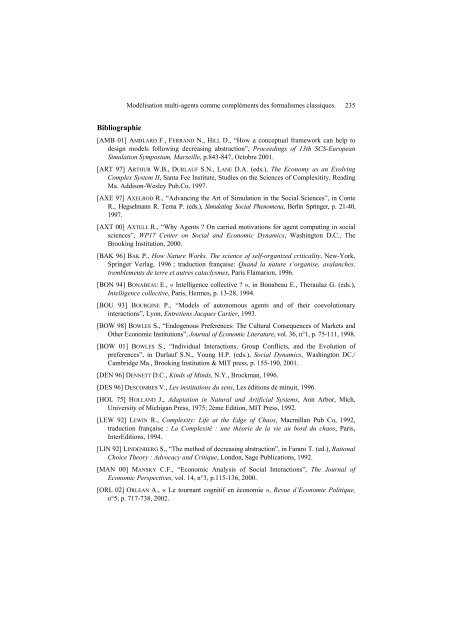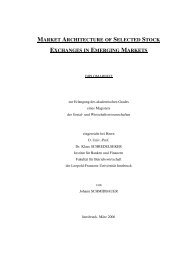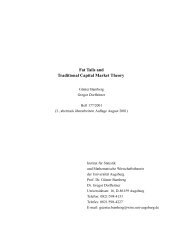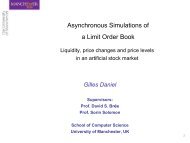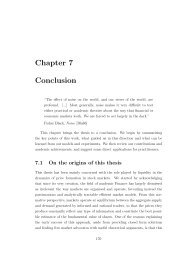- Page 1 and 2:
Table des matières PREMIERE PARTIE
- Page 3 and 4:
Première partie Introduction Depui
- Page 5 and 6:
Introduction . 9 permettent de form
- Page 7 and 8:
Chapitre 1 Concepts et méthodologi
- Page 9 and 10:
Concepts et méthodologies multi-ag
- Page 11 and 12:
Concepts et méthodologies multi-ag
- Page 13 and 14:
Concepts et méthodologies multi-ag
- Page 15 and 16:
Concepts et méthodologies multi-ag
- Page 17 and 18:
Concepts et méthodologies multi-ag
- Page 19 and 20:
Concepts et méthodologies multi-ag
- Page 21 and 22:
Concepts et méthodologies multi-ag
- Page 23 and 24:
Concepts et méthodologies multi-ag
- Page 25 and 26:
Concepts et méthodologies multi-ag
- Page 27 and 28:
Concepts et méthodologies multi-ag
- Page 29 and 30:
Concepts et méthodologies multi-ag
- Page 31 and 32:
Concepts et méthodologies multi-ag
- Page 33 and 34:
Chapitre 2 Introduction à la modé
- Page 35 and 36:
Introduction à la modélisation et
- Page 37 and 38:
Introduction à la modélisation et
- Page 39 and 40:
Introduction à la modélisation et
- Page 41 and 42:
Introduction à la modélisation et
- Page 43 and 44:
Introduction à la modélisation et
- Page 45 and 46:
Introduction à la modélisation et
- Page 47 and 48:
Introduction à la modélisation et
- Page 49 and 50:
Introduction à la modélisation et
- Page 51 and 52:
Introduction à la modélisation et
- Page 53 and 54:
Introduction à la modélisation et
- Page 55 and 56:
Introduction à la modélisation et
- Page 57 and 58:
Chapitre 3 Explorer les modèles pa
- Page 59 and 60:
Explorer les modèles par simulatio
- Page 61 and 62:
Explorer les modèles par simulatio
- Page 63 and 64:
Explorer les modèles par simulatio
- Page 65 and 66:
Explorer les modèles par simulatio
- Page 67 and 68:
Explorer les modèles par simulatio
- Page 69 and 70:
Explorer les modèles par simulatio
- Page 71 and 72:
Explorer les modèles par simulatio
- Page 73 and 74:
Explorer les modèles par simulatio
- Page 75 and 76:
Explorer les modèles par simulatio
- Page 77 and 78:
Explorer les modèles par simulatio
- Page 79 and 80:
Explorer les modèles par simulatio
- Page 81 and 82:
Explorer les modèles par simulatio
- Page 83 and 84:
Chapitre 4 Evaluation et validation
- Page 85 and 86:
Evaluation et validation de modèle
- Page 87 and 88:
Evaluation et validation de modèle
- Page 89 and 90:
Evaluation et validation de modèle
- Page 91 and 92:
Evaluation et validation de modèle
- Page 93 and 94:
Evaluation et validation de modèle
- Page 95 and 96:
Evaluation et validation de modèle
- Page 97 and 98:
Evaluation et validation de modèle
- Page 99 and 100:
Evaluation et validation de modèle
- Page 101 and 102:
Annexe - épistémologie dans une c
- Page 103 and 104:
Annexe - épistémologie dans une c
- Page 105 and 106:
Annexe - épistémologie dans une c
- Page 107 and 108:
Annexe - épistémologie dans une c
- Page 109 and 110:
Annexe - épistémologie dans une c
- Page 111 and 112:
Annexe - épistémologie dans une c
- Page 113 and 114:
Annexe - épistémologie dans une c
- Page 115 and 116:
Annexe - épistémologie dans une c
- Page 117 and 118:
Evaluation et validation de modèle
- Page 119 and 120:
Chapitre 5 Sciences sociales comput
- Page 121 and 122:
Sciences sociales computationnelles
- Page 123 and 124:
Sciences sociales computationnelles
- Page 125 and 126:
Sciences sociales computationnelles
- Page 127 and 128:
Sciences sociales computationnelles
- Page 129 and 130:
Sciences sociales computationnelles
- Page 131 and 132:
Sciences sociales computationnelles
- Page 133 and 134:
Sciences sociales computationnelles
- Page 135 and 136:
Sciences sociales computationnelles
- Page 137 and 138:
Chapitre 6 La fin des débuts pour
- Page 139 and 140:
La fin des débuts pour les systèm
- Page 141 and 142:
La fin des débuts pour les systèm
- Page 143 and 144:
La fin des débuts pour les systèm
- Page 145 and 146:
La fin des débuts pour les systèm
- Page 147 and 148:
Chapitre 7 Les modèles agent en g
- Page 149 and 150:
Les modèles agent en géographie u
- Page 151 and 152:
Les modèles agent en géographie u
- Page 153 and 154:
Les modèles agent en géographie u
- Page 155 and 156:
Les modèles agent en géographie u
- Page 157 and 158:
Les modèles agent en géographie u
- Page 159 and 160:
Les modèles agent en géographie u
- Page 161 and 162:
Les modèles agent en géographie u
- Page 163 and 164:
Les modèles agent en géographie u
- Page 165 and 166:
Chapitre 8 Essai d’épistémologi
- Page 167 and 168:
Essai d’épistémologie de la sim
- Page 169 and 170:
Essai d’épistémologie de la sim
- Page 171 and 172:
Essai d’épistémologie de la sim
- Page 173 and 174:
Essai d’épistémologie de la sim
- Page 175 and 176:
Essai d’épistémologie de la sim
- Page 177 and 178:
Essai d’épistémologie de la sim
- Page 179 and 180: Essai d’épistémologie de la sim
- Page 181 and 182: Essai d’épistémologie de la sim
- Page 183 and 184: Essai d’épistémologie de la sim
- Page 185 and 186: Essai d’épistémologie de la sim
- Page 187 and 188: Essai d’épistémologie de la sim
- Page 189 and 190: Essai d’épistémologie de la sim
- Page 191 and 192: Chapitre 9 Modéliser avec et pour
- Page 193 and 194: Modéliser avec et pour les acteurs
- Page 195 and 196: Modéliser avec et pour les acteurs
- Page 197 and 198: Modéliser avec et pour les acteurs
- Page 199 and 200: Modéliser avec et pour les acteurs
- Page 201 and 202: Modéliser avec et pour les acteurs
- Page 203 and 204: Modéliser avec et pour les acteurs
- Page 205 and 206: Modéliser avec et pour les acteurs
- Page 207 and 208: Modéliser avec et pour les acteurs
- Page 209 and 210: Modéliser avec et pour les acteurs
- Page 211 and 212: Modéliser avec et pour les acteurs
- Page 213 and 214: Chapitre 10 Modélisation d’accom
- Page 215 and 216: Modélisation d’accompagnement. 2
- Page 217 and 218: Modélisation d’accompagnement. 2
- Page 219 and 220: Modélisation d’accompagnement. 2
- Page 221 and 222: Modélisation d’accompagnement. 2
- Page 223 and 224: Modélisation d’accompagnement. 2
- Page 225 and 226: Deuxième partie Modélisation et s
- Page 227 and 228: Modélisation multi-agents comme co
- Page 229: Modélisation multi-agents comme co
- Page 233 and 234: Chapitre 11 Des réseaux d’automa
- Page 235 and 236: Des réseaux d’automates aux mod
- Page 237 and 238: Des réseaux d’automates aux mod
- Page 239 and 240: Des réseaux d’automates aux mod
- Page 241 and 242: Des réseaux d’automates aux mod
- Page 243 and 244: Des réseaux d’automates aux mod
- Page 245 and 246: Des réseaux d’automates aux mod
- Page 247 and 248: Des réseaux d’automates aux mod
- Page 249 and 250: Des réseaux d’automates aux mod
- Page 251 and 252: Des réseaux d’automates aux mod
- Page 253 and 254: Des réseaux d’automates aux mod
- Page 255 and 256: Des réseaux d’automates aux mod
- Page 257 and 258: Des réseaux d’automates aux mod
- Page 259 and 260: Des réseaux d’automates aux mod
- Page 261 and 262: Chapitre 12 Modélisation, impléme
- Page 263 and 264: Modélisation, implémentation et e
- Page 265 and 266: Modélisation, implémentation et e
- Page 267 and 268: Modélisation, implémentation et e
- Page 269 and 270: Modélisation, implémentation et e
- Page 271 and 272: Modélisation, implémentation et e
- Page 273 and 274: Modélisation, implémentation et e
- Page 275 and 276: Modélisation, implémentation et e
- Page 277 and 278: Chapitre 13 Apprentissage dans les
- Page 279 and 280: Apprentissage dans les modèles mul
- Page 281 and 282:
Apprentissage dans les modèles mul
- Page 283 and 284:
Apprentissage dans les modèles mul
- Page 285 and 286:
Apprentissage dans les modèles mul
- Page 287 and 288:
Apprentissage dans les modèles mul
- Page 289 and 290:
Apprentissage dans les modèles mul
- Page 291 and 292:
Apprentissage dans les modèles mul
- Page 293 and 294:
Apprentissage dans les modèles mul
- Page 295 and 296:
Apprentissage dans les modèles mul
- Page 297 and 298:
Apprentissage dans les modèles mul
- Page 299 and 300:
Chapitre 14 Influence sociale, jeux
- Page 301 and 302:
Influence sociale, jeux de populati
- Page 303 and 304:
Influence sociale, jeux de populati
- Page 305 and 306:
Influence sociale, jeux de populati
- Page 307 and 308:
Influence sociale, jeux de populati
- Page 309 and 310:
Influence sociale, jeux de populati
- Page 311 and 312:
Influence sociale, jeux de populati
- Page 313 and 314:
Influence sociale, jeux de populati
- Page 315 and 316:
Influence sociale, jeux de populati
- Page 317 and 318:
Influence sociale, jeux de populati
- Page 319 and 320:
Influence sociale, jeux de populati
- Page 321 and 322:
Influence sociale, jeux de populati
- Page 323 and 324:
Troisième Partie Introduction à l
- Page 325 and 326:
Modélisation multi-agents des syst
- Page 327 and 328:
Chapitre 15 Approche conceptuelle d
- Page 329 and 330:
Approche conceptuelle de l’espace
- Page 331 and 332:
Approche conceptuelle de l’espace
- Page 333 and 334:
Approche conceptuelle de l’espace
- Page 335 and 336:
Approche conceptuelle de l’espace
- Page 337 and 338:
Approche conceptuelle de l’espace
- Page 339 and 340:
Approche conceptuelle de l’espace
- Page 341 and 342:
Approche conceptuelle de l’espace
- Page 343 and 344:
Approche conceptuelle de l’espace
- Page 345 and 346:
Approche conceptuelle de l’espace
- Page 347 and 348:
Approche conceptuelle de l’espace
- Page 349 and 350:
Chapitre 16 « A Monte Carlo approa
- Page 351 and 352:
« A Monte Carlo approach to diffus
- Page 353 and 354:
« A Monte Carlo approach to diffus
- Page 355 and 356:
« A Monte Carlo approach to diffus
- Page 357 and 358:
« A Monte Carlo approach to diffus
- Page 359 and 360:
« A Monte Carlo approach to diffus
- Page 361 and 362:
« A Monte Carlo approach to diffus
- Page 363 and 364:
« A Monte Carlo approach to diffus
- Page 365 and 366:
« A Monte Carlo approach to diffus
- Page 367 and 368:
« A Monte Carlo approach to diffus
- Page 369 and 370:
« A Monte Carlo approach to diffus
- Page 371 and 372:
« A Monte Carlo approach to diffus
- Page 373:
« A Monte Carlo approach to diffus
- Page 376 and 377:
380 Modélisation et simulation mul
- Page 378 and 379:
382 Modélisation et simulation mul
- Page 380 and 381:
384 Modélisation et simulation mul
- Page 382 and 383:
386 Modélisation et simulation mul
- Page 384 and 385:
388 Modélisation et simulation mul
- Page 386 and 387:
390 Modélisation et simulation mul
- Page 388 and 389:
392 Modélisation et simulation mul
- Page 390 and 391:
394 Modélisation et simulation mul
- Page 392 and 393:
396 Modélisation et simulation mul
- Page 394 and 395:
398 Modélisation et simulation mul
- Page 396 and 397:
400 Modélisation et simulation mul
- Page 398 and 399:
402 Modélisation et simulation mul
- Page 400 and 401:
404 Modélisation et simulation mul
- Page 402 and 403:
406 Modélisation et simulation mul
- Page 404 and 405:
408 Modélisation et simulation mul
- Page 406 and 407:
410 Modélisation et simulation mul
- Page 408 and 409:
412 Modélisation et simulation mul
- Page 410:
414 Modélisation et simulation mul


